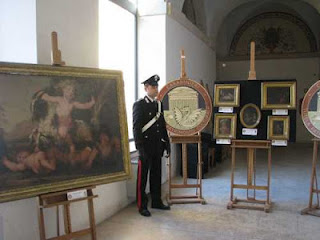Monday, March 26, 2012 -  1971 theft,Andrea Meldolla,Antonio Diziani,Carabinieri Art Squad,Giordano,Giulio Carpioni,Il Veronese,Rome,Rosa da Tivoli,Ruoppolo,Salvator Rosa,Stolen Art Recovered,TPC
1971 theft,Andrea Meldolla,Antonio Diziani,Carabinieri Art Squad,Giordano,Giulio Carpioni,Il Veronese,Rome,Rosa da Tivoli,Ruoppolo,Salvator Rosa,Stolen Art Recovered,TPC
 1 comment
1 comment
 1971 theft,Andrea Meldolla,Antonio Diziani,Carabinieri Art Squad,Giordano,Giulio Carpioni,Il Veronese,Rome,Rosa da Tivoli,Ruoppolo,Salvator Rosa,Stolen Art Recovered,TPC
1971 theft,Andrea Meldolla,Antonio Diziani,Carabinieri Art Squad,Giordano,Giulio Carpioni,Il Veronese,Rome,Rosa da Tivoli,Ruoppolo,Salvator Rosa,Stolen Art Recovered,TPC
 1 comment
1 comment
List of artworks recovered by the Carabinieri TPC in Rome in March 2012 -- 41 years after they were reported stolen from a private residence in the same district
-+Giuditta+e+Oloferne.jpg) |
| Guido Reni's Judith and Holofernes |
Earlier this month, the Carabinieri's del Reparto Operativo Tutela Patrimonio Culturale di Roma (TPC, Division for the Protection of Cultural Heritage) recovered 37 paintings that had been stolen from a private residence in 1971. The artworks hadn't left Rome's Parioli neighborhood from where they had been stolen. Apparently, a couple had purchased 37 of the paintings twenty years ago in a private sale. When the husband died, the 50-year-old widow placed four of the paintings in an auction sales catalogue. In a routine operation, a Carabinieri officer had matched those images to the TPC's stolen art database which contains more than 3 million stolen artworks. Eleven paintings stolen in 1971 were found in the woman's home in Rome and another 26 works in another home located outside the city.
+-+Cristo+in+croce.jpg) |
| Peter Paul Rubens' Christ on the Cross |
Oil on canvas, Philipp Peter Roos/Rosa da Tivoli (1657-1706), Three putti playing with a goat, 97x134 cm;
Oil on canvas, Andrea Meldolla/Lo Schiavone (1510-1563), Venus and Love, 98x123 cm;
Oil on canvas, Salvator Rosa (1615-1673), lake landscape with soldiers, 36x70 cm;
A pair of oil on canvas paintings, Antonio Diziani (1737-1797), country market, 40x60 cm;
Oil on canvas, Giulio Carpioni (1613-1678), Bacco and Arianna, 63x53 cm;
Oil on canvas, school of Paolo Caliari/Il Veronese (1528-1588), Scene with Saints, martyrs and angels, 75x62 cm;
Oil on canvas, Guido Reni (1575-1642), Judith and Holofernes, 39x30 cm;
+-+Ritratto+di+cavaliere.jpg) |
| Van Dyck's Portrait of a Knight |
Oil on canvas, Peter Paul Rubens (1577-1640), Christ on the cross, 47x27 cm;
Oil on canvas, Antoon Van Dyck (1599-1641), Portrait of a Knight, 36x28 cm;
Oil on canvas, Jean-Honoré Fragonard (1732-1806), Portrait of a Lady, 40x33 cm;
Tempera on wood panel with gold background, Berlinghiero Berlinghieri (late 12th century - 1236), Madonna with Child, 69x39 cm;
Tempera on wood panel with gold background, school of Pisa, Madonna with Child, 52x40 cm;
+-+Battesimo+di+Cristo.jpg) |
| Nicolas Poussin's Baptism of Christ |
Oil on canvas, Giovan Battista Recco (1615-1660), still life with fish, 53x70 cm;
Oil on canvas, school of Caravaggio, depicting still life with fruit, 40x66 cm.
Oil on canvas, Nicolas Poussin (1594-1665, Baptism of Christ, 50x66 cm; and
Tempera on wood panel, Taddeo Gaddi (1290-1366), Crucifixion, 55x23 cm.



+-+Crocifissione+-+Dio+in+trono.gif)
+-+Ritratto+uomo+a+mezzo+busto.jpg)

+-+S.+Giovanni+Evangelista.jpg)

+-+Ritratto+di+cavaliere.jpg)
+-+Ritratto+di+dama.jpg)
-+Giuditta+e+Oloferne.jpg)
+-+Ritratto+di+contadina.jpg)
+-+Cristo+in+croce.jpg)
+-+Danae.jpg)



+-+Scena+canevalesca.jpg)
+-+Mercato+di+paese.jpg)
+-+Mercato+di+paese.jpg)
+-+Paesaggio+lacustre+con+soldati.jpg)

+-+Battesimo+di+Cristo.jpg)

+-+Paesaggio+campestre.jpg)
+-+Paesaggio+campestre.jpg)
+-+Natura+morta+con+pesci.jpg)
+-+Ratto+delle+sabine.jpg)
+-+Scena+agreste.jpg)
+-+Natura+morta+con+frutta.jpg)
+-+Bacco+e+Arianna.jpg)
+-+Scena+religiosa.jpg)


+-+Madonna+con+Bambino).gif)
+-+Nativita%CC%80.gif)
+-+Venere+e+amore.jpg)



